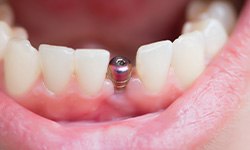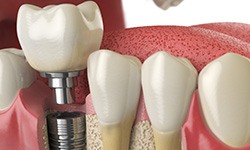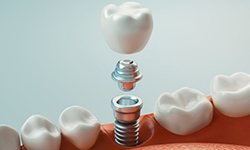


Do your missing teeth make living your daily life increasingly frustrating and difficult? Do you avoid smiling in front of other, saying certain words, or eating certain foods? Do you wish you could just have your real teeth back? While that’s not possible, dental implants are able to look and feel exactly like the teeth you used to have. They make smiling, eating, and talking a breeze again! Dr. Natalie Ortiz and Dr. Ramon Ortiz work closely with the best dental implant specialists in the area to ensure you receive the top-notch tooth replacement care you deserve. If you’re ready to learn more about how dental implants in Las Cruces can revitalize your smile after tooth loss, contact Painted Skies Dental Center today!

A dental implant is a small, screw-shaped post that is made out of titanium or another biocompatible material. Dental implants differ from other types of tooth replacements because instead of being placed on top of the gums or existing teeth, implants are instead inserted into the jaw, where they merge with the surrounding bone and tissue. This unique process, called osseointegration, allows dental implants to act as new tooth roots for a custom crown, bridge, or denture. As a result, the strength and stability they offer is unparalleled in comparison to traditional methods. Not to mention, dental implants are capable of lasting for several decades as long as you take good care of them!

Dental implants have a more complex treatment process than dentures or dental bridges; they take a few months to get. Still, rest easy - their long-term benefits are worth the time and effort! Our practice ensures top results by working with local specialists for the placement surgery. That way, you’ll get trustworthy care from skilled and experienced oral surgeons. As for the treatment, expect these four steps: consultation, surgery, osseointegration, and delivery of the final restoration. Please keep reading to learn more, or call us.

Before the actual surgery, you’ll see our dentists for a consultation. This session lets us check your treatment goals, as well as your oral health background and similar factors. We’ll review such details to learn if dental implants suit you and adjust your final procedure(s).
Should we decide you don’t qualify for dental implants, you needn’t worry. You can become a good candidate later through extra procedures – gum disease treatment, tooth extractions, etc. Those services (which we could help arrange) would strengthen your mouth to handle implant posts.

If you qualify, we’ll refer you to local specialists for dental implant surgery. That means your treatment will benefit from oral surgeons with great skill and expertise. In other words, you can better trust that you’ll get excellent results!
The dental implant surgery will involve several steps. Firstly, the surgeon(s) will numb your treatment site so it won’t hurt during the procedure; it’ll only feel a slight pressure at most. They’ll then make a small incision in your gums, creating space for your future implant insertion. The surgeon will later place the actual implant before suturing your gums shut. From there, they’ll conclude the surgery by putting a protective cap over the post.

Your dental implant(s) will fuse with your jaw after surgery. This process (i.e., osseointegration) takes roughly 4-6 months, and it secures the “new tooth” once finished. It’ll leave your new dental implant stable and a permanent part of your mouth.
After the fusion wraps up, you’ll attend a follow-up surgery at our office. That’s when we’ll place the abutment – a special metal connector – that secures your restoration. Following this part’s placement, a dental lab will craft the final restoration over a few weeks or so.

Our dentists will deliver your final restoration at the end of your implant treatment. More specifically, they’ll place a prosthetic that’s consistent with how many “new” teeth you need. This device could range from a dental crown or bridge to a complex implant denture.
Overall, it shouldn’t take long to fit your final restoration. Our dental team will only need to apply some dental cement for this step, followed by some last-minute changes to ensure good results. When those matters are done, you can leave our office with your newly-restored smile!

Unlike other options for tooth replacement, dental implants bring back the entire tooth, including the root. As a result, they offer countless advantages when compared to regular dentures and bridges. In fact, there are plenty of benefits of dental implants that you may not have considered before. Here are a few of the reasons why dental implants are the best tooth replacement in both the short and long term!




Whether you’ve lost one tooth or an entire arch of teeth, there’s a dental implant solution that can meet your needs. By combining dental implants with dental restorations, you can regain your smile’s health, function, strength, and beauty.

For a single missing tooth, we attach a dental crown to an individual implant, which will be surgically placed into your jawbone by a specialist. Once the jawbone has grown around it, you’ll return to our dental office so that we can attach the dental crown on top.

When patients are missing two teeth in a row, we typically create two dental crowns fused together that are attached to a single dental implant. Those patients missing three to four consecutive teeth will likely need a fixed bridge which consists of three or four prosthetic teeth crafted as a single unit and supported on either end by a dental implant post.

Full dentures traditionally are held in place through suction between the denture and the gums, but implant-supported dentures offer superior support and stability by anchoring the denture to an average of four to eight dental implant posts.

Although dental implants typically have a higher upfront cost compared to bridges or dentures alone, implants are typically considered the wisest financial decision for tooth replacement because they last much longer and offer a higher quality of life. The cost for your dental implants will depend on how many you need, the type and location of your implants, and the restoration that will be attached to them. At your consultation, our team can help you determine an accurate price for your specific treatment to get your smile back up to par.

There are a variety of dental implants, the most popular being titanium ones. Depending on what materials are being used to replace your missing teeth, the cost will be different. In addition to this factor, the number of implants you need to have placed can also drastically impact the price. For example, replacing a single tooth will require the placement of one post, while replacing two or more requires multiple in order to support the restoration.
If you’re looking to have an entire arch of missing teeth replaced, an implant denture can require the placement of anywhere from four to eight posts. This will affect the surgery time, amount of anesthesia required, and several other factors that affect the price.

The dental implant process can be broken down into a few separate stages. The good news is that you don’t have to pay for everything upfront. Rather, you’ll pay for each individual procedure as you need it over the course of several months. Here are the separate visits that you can expect to pay for:

Patients and professionals will agree that dental implants are well worth the investment. Over the long run, these are more cost-effective than having to replace multiple traditional restorations. Plus, they can last over three decades when they’re properly cared for. They also reduce your risk of experiencing costly oral health problems like bone decay, additional tooth loss, and gum disease.

Most dental insurance policies do not cover implants because they’re considered a cosmetic procedure. However, this is slowly beginning to change, so it’s worth it to contact your insurance provider to double-check. We’ll be more than happy to help maximize your coverage and explore additional financing options with you as well. Plus, at Painted Skies Dental Center, we accept most major providers and will help develop a payment plan that fits your unique needs.

After investing your valuable time and money into the process of restoring your smile with dental implants, the last thing you want is for them to fail. The good news is that there are a few things you can do to prevent that from happening, starting with making oral hygiene a priority. To learn more, keep reading, or schedule a consultation with our Las Cruces dental team.

Dental implants can fail for several reasons, but one of the most common ones is peri-implantitis. This is a form of gum disease that develops from poor oral hygiene habits, like not flossing consistently. That’s why it’s so important that you make dental care a priority! That means brushing twice a day, flossing daily, and rinsing with mouthwash consistently.

In short, what you eat can both positively and negatively affect your oral health. After all, extremely crunchy foods, like hard pretzels, can cause your restoration to chip. Conversely, vegetables, like broccoli, are packed with nutrients, which helps your body fight off infections. So, prioritize adding vitamin-rich foods to your diet when you can!

Another thing that dramatically increases your risk of dental implant failure is bad habits. Smoking is a great example because – in addition to delaying the healing process – it can wreak havoc on your gums. Biting your nails, using your teeth to remove plastic packaging, and chewing on ice cubes can also lead to serious chips, cracks, and fractures, so it’s crucial that you break those habits as well.

Do you grind/clench your teeth at night? If so, you should schedule an appointment with our Las Cruces dental team so we can have a custom nightguard made. This will protect both your teeth and your dental implants from harm, reducing the chances of a dental emergency.
Important note: You should have a custom mouthguard made if you participate in sports as well (including non-contact ones, like cycling, surfing, and skateboarding).

Last, but certainly not least, you need to schedule a dental checkup and cleaning twice a year. These biannual visits serve several important purposes – from removing built-up tartar and screening for oral cancer to catching tooth decay in the early stages and checking the condition of your dental implants. So, even if you don’t have any of your natural teeth left, make these routine visits a priority.
Dental implants are available in a variety of metals, ceramics, and polymers. We will most often recommend high quality, time-tested titanium implant posts. However, for those patients who have metal allergies or sensitivities, a zirconia implant may be a better option.
Your implant placement surgery is actually minimally invasive and completed quickly and comfortably. We numb the area around the empty socket. Then, a small incision is made into the soft tissue. Your implant post is placed. A protective cap is attached to the implant post. Then, you’ll wait for three to six months in order to allow the implantation site to fully heal and the implant post to fuse with the gums before returning to our dental office to receive your final replacement tooth or teeth.
The number of implant posts you need depends on how many teeth are missing and where they’re located in your smile. We will usually recommend the following:
The cost of dental implants varies based on a number of factors, including the material, manufacturer, and size of the post. In most cases, a single implant post will cost between $500 and $3,000. Our team can help you to plan for the out-of-pocket costs of implant-supported tooth replacement.
Implant-supported replacement teeth have a high success rate after two decades, and many patients are able to maintain their flawlessly repaired smile for the rest of their lives.
Many patients hear horror stories about dental implant failure. While this is a possibility, it’s extremely rare. With detailed planning prior to placement and appropriate oral health care after implantation, a dental implant supported replacement tooth or teeth has a 90 to 95% success rate after 20 years. This is compared to traditional tooth replacement options that need to be replaced every five to ten years.